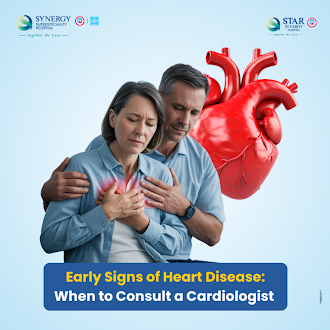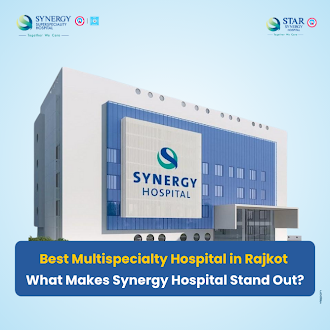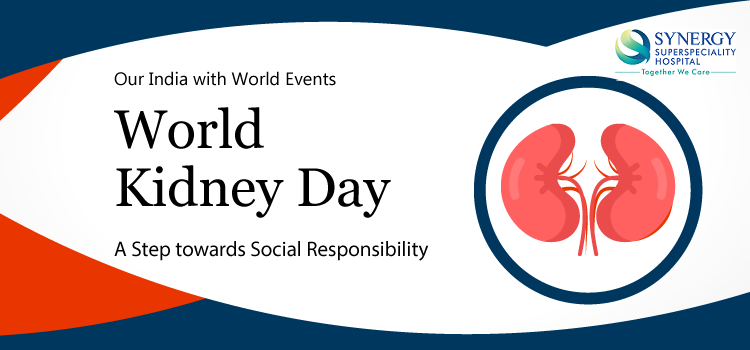Early Signs of Heart Disease: When to Consult a Cardiologist
- |
- October 7, 2025
Heart disease remains one of the leading causes of morbidity and mortality worldwide, including in India. Despite advancements in cardiac care, the burden continues to rise, largely due to late diagnosis and lack of awareness about early symptoms. Recognizing the early signs of heart disease and seeking timely consultation with an experienced cardiologist in Rajkot can be life-saving.
This article explores the initial symptoms of heart disease, when you should seek professional evaluation, and why Synergy Hospital is trusted for comprehensive heart disease treatment in Rajkot.
What are the Early Signs of Heart Disease?
Heart disease doesn’t always announce itself with dramatic symptoms. In many cases, the warning signs are subtle and gradual. Identifying them early allows for proactive management and significantly reduces the risk of serious complications.
Common Symptoms of Heart Problems Include:
- Mild to moderate chest discomfort or tightness
- Shortness of breath during exertion or at rest
- Palpitations or irregular heartbeat
- Persistent fatigue or weakness
- Dizziness or lightheadedness
- Swelling in the legs, ankles, or feet
- Pain or discomfort in the jaw, shoulder, or arms
If you or a family member is experiencing any of these symptoms of heart problems, it is essential to seek immediate evaluation by a qualified heart specialist in Rajkot.
When Should You See a Cardiologist?
Consulting a cardiologist in Rajkot is not limited to those already diagnosed with heart disease. There are multiple scenarios in which an expert consultation is highly recommended:
1. Presence of Risk Factors
Individuals with hypertension, diabetes, high cholesterol, or a history of smoking are at an elevated risk for cardiovascular conditions. Routine evaluations with a heart doctor in Rajkot are crucial for early detection and preventive care.
2. Family History of Cardiac Conditions
A family history of heart attacks or strokes—especially at a young age—warrants early screening and lifestyle counselling by a cardiologist to mitigate genetic risks.
3. Unexplained Physical Symptoms
Ongoing fatigue, breathlessness, or chest discomfort—even if mild—should never be ignored. These are among the most frequently overlooked early signs of heart disease.
4. Sedentary Lifestyle or Obesity
A lack of physical activity and poor dietary habits can silently contribute to the development of heart conditions. Early evaluation allows for timely intervention and guidance.
Synergy Hospital: Trusted for Heart Disease Treatment in Rajkot
Synergy Hospital is a leading multi-speciality institution offering advanced cardiac care delivered by some of the best cardiologists in Rajkot. The hospital is committed to clinical excellence, compassionate care, and the use of cutting-edge technology in cardiac diagnosis and treatment.
What Makes Synergy Hospital a Premier Choice?
-
Experienced Cardiology Team
Our cardiac unit is led by highly qualified and board-certified heart specialists in Rajkot, known for their clinical expertise in diagnosing and treating complex cardiac conditions.
-
State-of-the-Art Diagnostics
We offer a full suite of advanced diagnostic services, including ECG, 2D-Echocardiography, TMT, and Holter Monitoring. These tests ensure precise and early diagnosis, forming the foundation for effective treatment.
-
Emergency & Interventional Cardiology
From acute chest pain management to angiography, angioplasty, and critical care, our hospital is equipped for 24x7 cardiac emergencies.
-
Holistic Cardiac Rehabilitation
Post-treatment care is integral to recovery. We offer personalized lifestyle modification programs, dietary counselling, and regular follow-ups for long-term heart health.
Whether you're seeking a second opinion or advanced heart disease treatment in Rajkot, Synergy Hospital ensures high-quality, ethical, and result-oriented care.
The Role of a Cardiologist in Preventive Healthcare
A cardiologist in Rajkot does much more than treat heart attacks. Today’s cardiac care also emphasizes preventive cardiology, which includes:
- Regular screening of high-risk individuals
- Early intervention based on diagnostic trends
- Diet, exercise, and medication plans
- Ongoing monitoring to avoid disease progression
By collaborating with a trusted heart doctor in Rajkot, you can take proactive steps toward protecting your cardiovascular health and improving your quality of life.
Preparing for Your Cardiology Appointment
If this is your first visit to a cardiologist in Rajkot, preparation ensures you make the most of your consultation:
- Bring previous medical records, especially any ECG, lab results, or imaging reports.
- Prepare a list of symptoms you've experienced, no matter how minor.
- Inform the doctor about your current medications and lifestyle habits.
- Be open to undergoing basic diagnostic tests if advised.
Early-stage heart conditions can often be managed with lifestyle changes and medication, especially when diagnosed by a qualified heart specialist in Rajkot.
Importance of Regular Heart Checkups
Routine cardiac evaluations are essential, particularly for individuals over 40 or those with risk factors. Periodic visits to a heart doctor in Rajkot can help detect silent conditions such as:
- Coronary artery disease
- Arrhythmias (irregular heartbeat)
- Heart valve disorders
- Hypertensive heart disease
- Early-stage heart failure
Regular monitoring leads to timely treatment, reducing the risk of emergency hospitalizations.
Take Charge of Your Heart Health
Cardiovascular diseases are often preventable. With the right medical support and lifestyle habits, long-term heart health is achievable. Here’s what you can do:
- Adopt a balanced, heart-friendly diet low in saturated fats and sodium
- Exercise regularly, at least 30 minutes a day.
- Avoid tobacco and limit alcohol consumption.
- Manage stress through relaxation techniques or professional counselling.
- Schedule regular consultations with a qualified cardiologist in Rajkot.
Conclusion
Heart health should never be taken for granted. Many cardiovascular conditions can be managed—or even prevented—if addressed early. Whether you're experiencing warning signs or simply want to take a proactive approach to your health, consulting the best cardiologist in Rajkot is a wise step.
At Synergy Hospital, we are committed to offering comprehensive and compassionate cardiac care backed by experience, technology, and trust. Our team of skilled heart doctors in Rajkot is here to support your journey toward a healthier heart.
Book an Appointment
If you're concerned about your heart health or are seeking expert heart disease treatment in Rajkot, Synergy Hospital is here to help.
Visit www.synergyhospital.co.in or schedule your consultation with cardiologist doctors.










